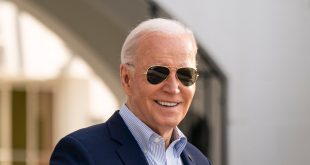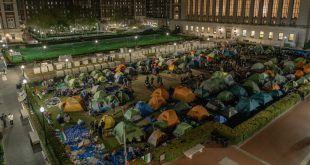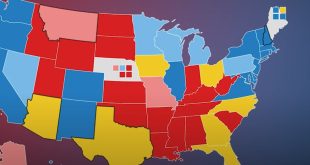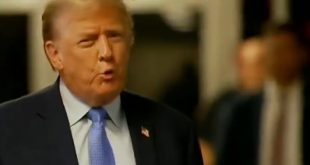The federal judge overseeing former President Donald J. Trump’s prosecution on charges of conspiring to overturn the 2020 election set a trial date on Monday for early March, rebuffing Mr. Trump’s proposal to push it off until 2026.
The decision by Judge Tanya S. Chutkan to start the trial on March 4 amounted to an early victory for prosecutors, who had asked for Jan. 2. But it potentially brought the proceeding into conflict with the three other trials that Mr. Trump is facing, underscoring the extraordinary complexities of his legal situation and the intersection of the prosecutions with his campaign to return to the White House.
The district attorney in Fulton County, Ga., has proposed taking Mr. Trump to trial on charges of tampering with the election in that state on March 4 as well. Another case, in Manhattan, in which Mr. Trump has been accused of more than 30 felonies connected to hush-money payments to a porn actress in the run-up the 2016 election, has been scheduled to go to trial on March 25.
And if the trial in Washington lasts more than 11 weeks, it could bump up against Mr. Trump’s other federal trial, on charges of illegally retaining classified documents after he left office and obstructing the government’s efforts to retrieve them. That trial is scheduled to begin in Florida in late May.
The March 4 date set by Judge Chutkan for the federal election case at a hearing in Federal District Court in Washington is the day before Super Tuesday, when 15 states are scheduled to hold Republican primaries or caucuses.
Judge Chutkan said that while she understood Mr. Trump had both other trial dates scheduled next year and, at the same time, was running for the country’s highest office, she was not going to let the intersection of his legal troubles and his political campaign get in the way of setting a date.
“Mr. Trump, like any defendant, will have to make the trial date work regardless of his schedule,” Judge Chutkan said, adding that “there is a societal interest to a speedy trial.”
Mr. Trump has now been indicted by grand juries four times in four places — Washington, New York, Atlanta and Florida — and prosecutors have been jockeying for position. All of them are trying to find time for their trials not only in relation to one another, but also against the backdrop of Mr. Trump’s crowded calendar as the candidate leading the field for the Republican Party’s 2024 presidential nomination.
While Judge Chutkan noted that she had spoken to the judge in the Manhattan case, it remained unclear how the judges, prosecutors and defense teams would address the problem of scheduling four criminal trials next year as Mr. Trump is campaigning.
The former president has made no secret in conversations with his aides that he would like to solve his uniquely complicated legal woes by winning the election. If either of his two federal trials is delayed until after the race and Mr. Trump prevails, he could seek to pardon himself after taking office or have his attorney general dismiss the matters altogether.
In remarks from the bench, Judge Chutkan, who was appointed by President Barack Obama, dismissed arguments made by Mr. Trump’s lawyers that they needed until April 2026 to prepare for the trial given the voluminous amount of discovery they will have to sort through. That extended period, the judge said, was “far beyond what is necessary” to prepare even for a trial of this magnitude.
As part of the hearing on Monday, John F. Lauro, a lawyer for Mr. Trump, previewed some of his defense case, identifying several motions that he and his colleague, Todd Blanche, planned to file on Mr. Trump’s behalf.
Mr. Lauro said he could file a motion as soon as next week arguing that Mr. Trump was immune to the charges, given that the indictment against him covers a period when he served as the nation’s commander in chief.
Mr. Lauro also said he was considering attacking the charges with a so-called selective prosecution motion. That motion, he said, would argue that Mr. Trump’s election interference indictment — brought by a special counsel appointed by the Biden administration — had been filed at least in part as retaliation for the federal investigation of Hunter Biden, President Biden’s son, which began in earnest during the Trump administration.
Moreover, Mr. Lauro told Judge Chutkan that he was planning to challenge each of the three conspiracy counts in the indictment brought against Mr. Trump early this month by the office of the special counsel, Jack Smith. Those counts accuse Mr. Trump of plotting to defraud the United States, to disrupt the certification of the election at a joint session of Congress on Jan. 6, 2021, and to deprive people of the right to have their vote counted.
“In our view, this is a political prosecution,” Mr. Lauro said.
Still, the issues surrounding the schedule of the trial took center stage at the 90-minute hearing, which Mr. Smith attended.
Prosecutors working for Mr. Smith have in said court papers that the government could take four to six weeks to present its case to the judge, with Mr. Trump’s lawyers estimating a roughly similar amount of time.
That timetable would push the trial well past the March 25 date that Justice Juan M. Merchan has set for the Manhattan trial and could edge close to or even beyond the May 20 date set for Mr. Trump’s federal trial in Florida.
Alvin L. Bragg, the Manhattan district attorney, signaled recently that he would be open to seeing the trial date for the Manhattan case moved, provided Justice Merchan agreed.
A spokeswoman for Mr. Bragg did not immediately respond to a request for comment. A spokesman for Fani T. Willis, the district attorney in Fulton County, Ga., declined to comment.
In the federal election case, Mr. Trump’s lawyers began complaining two weeks ago about the amount of evidence they would have to wade through as part of the discovery process when they first made their request to postpone the trial until April 2026 in court papers submitted to Judge Chutkan.
Mr. Lauro echoed that position in court on Monday. He took a sometimes aggressive tone in declaring that his client deserved a fair trial “no different than any American.”
“For a federal prosecutor to suggest that we could go to trial in four months is not only absurd, it’s a violation of the oath of justice,” Mr. Lauro said, adding, “We cannot do this in the time frame the government has outlined.”
In their own court papers, prosecutors had pushed back against Mr. Lauro’s protests about burdensome discovery, noting that much of the material was publicly available or known to Mr. Trump, having come from his 2020 presidential campaign or from political action committees associated with it.
Molly Gaston, one of the prosecutors in the case, added a few new details to the portrait of the discovery evidence on Monday, noting that even though the total number of pages had reached about 12.8 million, the defense could go through it electronically with keyword searches.
Ms. Gaston also said the government had created a file of about 300 key documents that served to annotate the 45-page indictment prosecutors filed against Mr. Trump early this month.
“It is essentially a road map to our case,” she said.
One of Ms. Gaston’s colleagues, Thomas P. Windom, told Judge Chutkan that the discovery evidence would include “a limited amount” of classified information, including about five to 10 sensitive documents, totaling fewer than 100 pages, and a 125-page transcript of an interview with a witness during which classified issues were discussed.
Mr. Windom asserted, however, that prosecutors did not expect to introduce any of the classified material during the trial.
In seeking to persuade Judge Chuktan to move quickly to trial, Ms. Gaston reminded her that Mr. Trump had repeatedly attacked the “integrity of the court and the citizens of D.C.” on social media in ways that could affect the case’s jury pool.
At a hearing last month, Judge Chutkan warned Mr. Trump that she would not tolerate him using social media posts to intimidate witnesses or taint potential jurors. Within days of that admonition, Mr. Trump tested Judge Chutkan’s resolve by making more dubious posts.
During the hearing on Monday, Judge Chutkan sought to calm Mr. Trump’s lawyer, Mr. Lauro, cautioning him twice to turn down the “temperature” when he was speaking.
At one point, she appeared upset by the way that Mr. Lauro in his filings about the trial schedule had cited Powell v. Alabama, a landmark 1932 Supreme Court decision that reversed the convictions of the Scottsboro Boys, nine young Black men who were falsely accused of raping a white woman.
Judge Chutkan pointed out that the Mr. Trump would face trial in seven months after he was indicted, compared with only one week in the Alabama case.
The two cases, she added, were “profoundly different” at their core.
Jonah E. Bromwich and Danny Hakim contributed reporting.
 Top Naija News: Nigerian News, Breaking News Nigeria and World News Top Naija News is a daily news publication in Nigeria, delivering the latest breaking news in Nigeria and around the world.
Top Naija News: Nigerian News, Breaking News Nigeria and World News Top Naija News is a daily news publication in Nigeria, delivering the latest breaking news in Nigeria and around the world.



